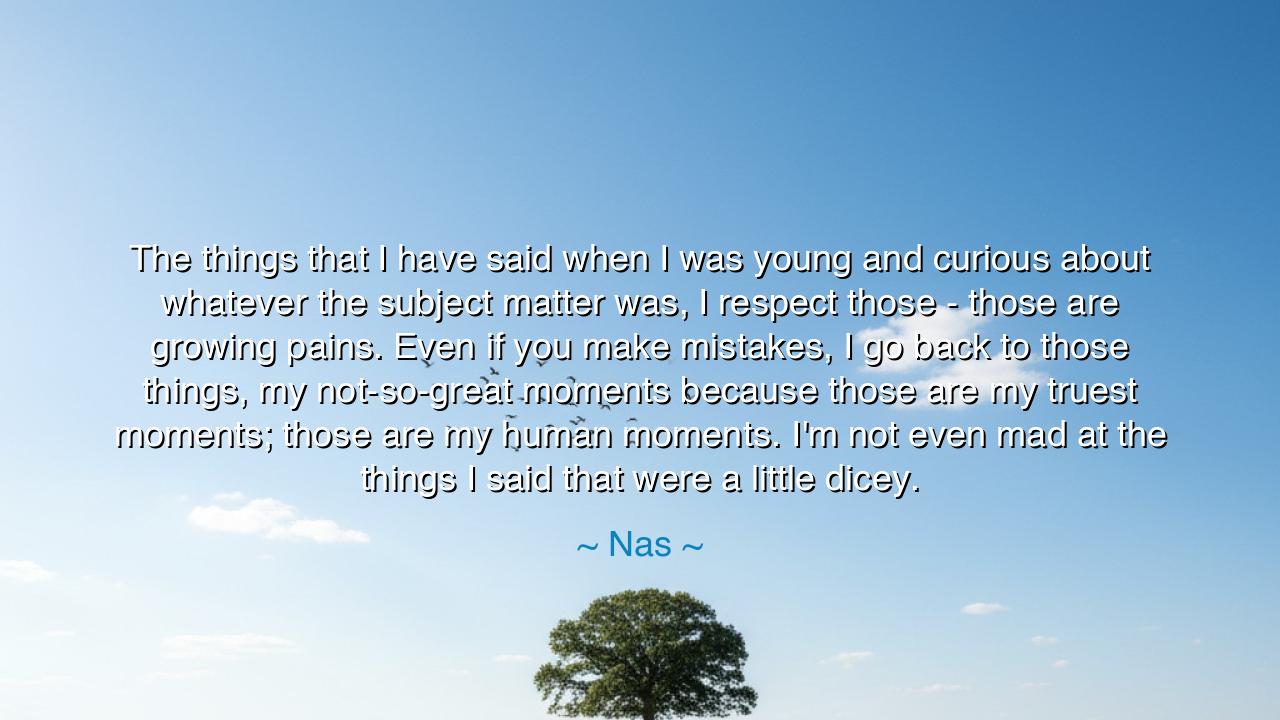
The things that I have said when I was young and curious about
The things that I have said when I was young and curious about whatever the subject matter was, I respect those - those are growing pains. Even if you make mistakes, I go back to those things, my not-so-great moments because those are my truest moments; those are my human moments. I'm not even mad at the things I said that were a little dicey.






Hear, O children of truth and becoming, the words of Nasir Jones, known to the world as Nas, poet of the streets and chronicler of the human soul, who declared: “The things that I have said when I was young and curious about whatever the subject matter was, I respect those—those are growing pains. Even if you make mistakes, I go back to those things, my not-so-great moments because those are my truest moments; those are my human moments. I'm not even mad at the things I said that were a little dicey.” In this confession lies the wisdom of age: that mistakes are not chains to bind us, but stepping stones that shape us. The stumbles of youth are not stains to erase, but marks of authenticity upon the journey of becoming.
The origin of this wisdom lies in Nas’s life as a young artist who rose from the hardships of Queensbridge to become a voice of a generation. In his youth, he spoke raw truths, sometimes harsh, sometimes unpolished, but always honest. As he matured, he looked back not with shame but with respect for the imperfect words of his younger self. For he understood that those early words were not polished marble but uncut stone—yet from such stone, the monuments of character are built. His quote is not merely about rap, but about the human condition: that our mistakes, our rough edges, are part of our truest self.
Consider, O listener, the story of Augustine of Hippo, who in his youth lived wildly, chasing pleasure and wandering in error. Later, he became one of the greatest voices of wisdom in the Christian world. In his Confessions, he did not hide his youthful failings; he embraced them as his “growing pains,” the very path through which he found truth. Augustine and Nas, though centuries apart, proclaim the same teaching: our imperfect past is not an enemy, but a teacher.
Nas also reveals that there is honor in human moments—those flashes when we are vulnerable, unrefined, even wrong. They reveal us not as statues, but as living beings, learning, fumbling, reaching. To deny them, to erase them, is to deny our humanity. To accept them, even the “dicey” words and deeds, is to stand in truth. For perfection is not the garment of man, but growth is. The youth who errs, yet seeks to understand, is closer to truth than the one who hides his flaws behind false virtue.
Let us also recall Abraham Lincoln, who in his early career made bold and sometimes unwise statements. Yet, as he grew in wisdom, he did not curse his younger self. He allowed his earlier missteps to teach him humility, to sharpen his words, to deepen his compassion. By the time he led a nation through civil war, his voice carried not only wisdom, but the authenticity of one who had grown through error. Here again we see Nas’s lesson: the stumbles of youth are the roots of wisdom in age.
O children of tomorrow, learn this well: do not despise your earlier self, nor bury your mistakes in shame. Respect your growing pains. For every error holds a lesson, every misstep a truth. Your “not-so-great moments” are the soil from which your greatest growth emerges. The man or woman who cannot forgive their younger self cannot stand whole, for they have severed their roots.
Practically, this means living with honesty and forgiveness. Do not edit your past to seem flawless, but embrace it with humility. When you stumble, learn. When you err, reflect. And when you look back, see not only your mistakes but the courage it took to speak, to act, to try. For in that trying lies your humanity, and in your humanity lies your greatness.
Thus Nas’s words endure as both confession and counsel: honor your truest moments, even the flawed ones, for they are the mirrors of your humanity. Let them not be shackles of regret but treasures of growth. In this way, your life will shine not because it is flawless, but because it is real, and in its reality, it will inspire others to embrace their own journey of becoming.






AAdministratorAdministrator
Welcome, honored guests. Please leave a comment, we will respond soon